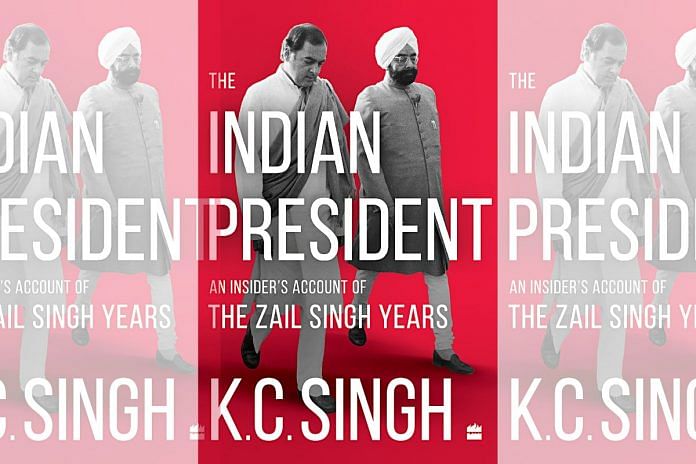New Delhi: With India electing its first tribal President, Droupadi Murmu, last year, a new book explores the significance of the President’s office in the Indian government as well as talking about the tenure of India’s seventh President Zail Singh from 1982 to 1987.
Published by HarperCollins India, ‘The Indian President: An Insider’s Account of the Zail Singh Years’ by K.C. Singh will be released on 29 March on Softcover, ThePrint’s online venue to launch non-fiction books.
The book narrates the times of Zail Singh, who rebuilt the essential guardrails established by the first two Presidents of the country — Rajendra Prasad and S. Radhakrishnan. Using vibrant anecdotes and observations, the author discusses the crucial role of Zail Singh in studying the potential of the highest office in Indian democracy.
The author K.C. Singh joined the diplomatic services in 1974 and was the deputy secretary to the President of India from 1983 to 1987. He was envoy to the United Arab Emirates(1999–2003) and to Iran (2003–05). During his time in the ministry, he served in Cairo, New York and Ankara and retired in May 2008 as secretary in the Ministry of External Affairs. Today, he works as a columnist and strategic analyst for national and international affairs.
“The President of India is constitutionally mandated to play a stabilising role in a maturing democracy with myriad conflicts of interest and views. Office holders swear to protect and defend the constitution. That oath has been historically inconsistently observed. The book deciphers the past to ensure that India is not condemned to repeat it,” said Singh
In the book’s 300 pages, divided in two parts, the author first examines the role of the President in Indian democracy and then explores the importance of President Zail Singh in the 1980s. The author decodes the role of the highest office, in diplomacy, when authoritarian governments are voted in power and even as an arbiter. Furthermore, Singh analyses the case of Zail Singh and then Prime Minister Rajiv Gandhi, who came to power with an overwhelming majority.
Swati Chopra, Associate Publisher at HarperCollins, says, “Ambassador KC Singh brings his experience as deputy secretary to President Singh to present an insider’s view of the years in which the former both tested and expanded the boundaries of his office. The Indian President ultimately foregrounds and debates crucial questions about India’s democracy and how it functions especially during tenures of elected governments with massive mandates, not unlike today’s.”
Also read: Importance of free speech rights, new book offers scrupulous look into sedition law in India



